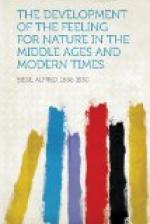This had already been stated by one of the most philosophic minds of the time, Pico della Mirandola, in his speech on the dignity of man. God, he tells us, made man at the close of creation to know the laws of the universe, to love its beauty, to admire its greatness. He bound him to no fixed place, to no prescribed form of work, and by no iron necessity; but gave him freedom to will and to move.
‘I have set thee,’ said the Creator to Adam, ’in the midst of the world, that thou mayest the more easily behold and see all that is therein. I created thee a being neither heavenly nor earthly, neither mortal nor immortal, only that thou mightest be free to shape and to overcome thyself. Thou mayest sink into a beast, and be born again to the Divine likeness. The brutes bring with them from their mothers’ body what they will carry with them as long as they live; the higher spirits are from the beginning, or soon after, what they will be for ever. To thee alone is given a growth and a development depending on thine own free will. Thou bearest in thee the germs of a universal life.’
The best men of the Renaissance realized this ideal of an all-round development, and it was the glory of Italy in the fourteenth and fifteenth centuries, that she found a new realm in the inner man at the very time that her discoveries across the seas were enlarging the boundaries of the external world, and her science was studying it. Mixed as the motives of the discoverers must have been, like those of the crusaders before them, and probably, for the most part, self-interested, it is easy to imagine the surprise they must have felt at seeing ignorant people, who, to quote Peter Martyr (de rebus oceanicis):[1]
Naked, without weights or measures or death-dealing money, live in a Golden Age without laws, without slanderous judges, without the scales of the balance. Contented with Nature, they spend their lives utterly untroubled for the future.... Theirs is a Golden Age; they do not enclose their farms with trench or wall or hurdle; their gardens are open. Without laws, without the scales of the balance, without judges, they guard the right by Nature’s light.
And their wonder at the novelties in climate and vegetation, the strange forests, brilliant birds, and splendid stars of the tropics, must have been no less.
Yet it is one thing to feel, and another to find words to convey the feeling to others; and the explorers often expressed regret for their lack of skill in this respect.
Also, and this is more important in criticizing what they wrote, these seamen were mostly simple, unlettered folk, to whom a country’s wealth in natural products and their practical value made the strongest appeal, and whose admiration of bays, harbours, trees, fields of grain, etc., was measured by the same standard of utility. Even such unskilled reporters did not entirely fail to refer to the beauty of Nature; but had it not been for the original and powerful mind of Christopher Columbus, we should have had little more in the way of description than ‘pleasant,’ ‘pretty,’ and such words.




